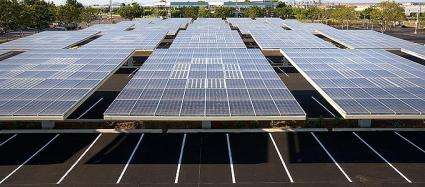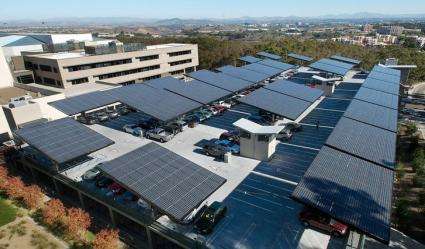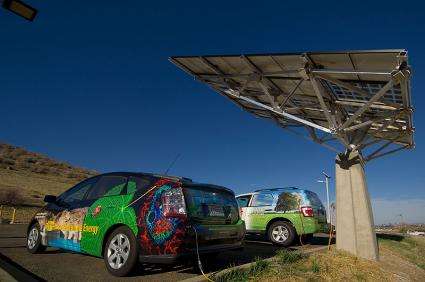July 12, 2010 report
Parking lots could become 'solar groves' (w/ Video)

(PhysOrg.com) -- Architect Robert Noble, who specializes in sustainable design has come up with the idea of turning parking lots into "solar groves" that shade the vehicles, generate electricity, and serve as recharging stations for electric vehicles.
Noble first had the idea of large solar canopies in 2004. A few companies were building carports with solar panels, but Noble’s idea went much further, and the following year he founded Envision Solar, which has since become the major developer of solar carports in the US. It also produces what it calls the Solar Grove to shade entire parking lots. The groves consist of large canopies covered with photovoltaic panels. In some installations some light is allowed to filter through to the ground beneath.
Large-scale solar groves have already been installed at the San Diego headquarters of the Kyocera Corporation of Japan, the headquarters of Johnson & Johnson subsidiary Centacor at Horsham, Pennsylvania, and the University of California in San Diego. The latter has two solar canopies, the Hopkins Parking Structure, which is built on the top floor of a parking garage, and the Gilman Parking Structure at one of the campus’s busiest entrances, where it is a constant reminder of the commitment of UCSD to sustainability.
The latest project of the company, in conjunction with Coulomb Technologies, a developer of charging stations for electric and hybrid vehicles, is the Solar Tree prototype at the National Renewable Energy laboratory (part of the Department of Energy) in Golden, Colorado. This pilot project covers two parking spaces and includes two AC outlets for charging plug-in hybrids or electric vehicles. A Solar Tree consists of a solar canopy with a single pole structure, and can be part of a multi-tree structure, or a single "tree" installation in a back yard, for example.

A large installation including two solar-to-electric vehicle charging stations has been installed at the headquarters of Dell Computers in Round Rock, Texas. This installation includes 11 Solar Trees that generate about 131,000 kWh per year and shade 56 parking spaces.
Covering parking lots with solar groves could reduce the criticism often aimed at electric car manufacturers, that the vehicles need to use electricity that often does not come from renewable sources, and it could also reduce criticisms about excessive land use for large-scale solar power plants. Mr Noble said that converting the “desert of concrete parking lots” into small power plants sidesteps both problems.

Mr Noble said it would take some time, but he hopes that in perhaps 20 years or so there could be a “hyperconvergence” of transport, energy and infrastructure that could lead to widespread deployment of solar canopies for parking lots.
More information: envisionsolar.com/project-portfolio/parksolar/
© 2010 PhysOrg.com



















